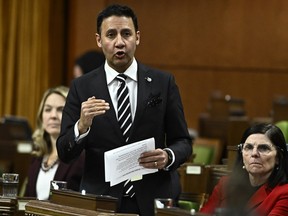
Article content
If the Trudeau government is serious about its online harms legislation, as opposed to just playing politics, then it should stop trying to sneak through a bad bill by claiming it’s all about protecting children.
Advertisement 2
Article content
Bill C-63 is not, primarily, about protecting children.
Article content
It’s about imposing dangerous restrictions on free speech.
There is, however, a solution.
The Liberals say their proposed legislation is meant to address harmful online content in seven categories.
In the government’s words these are:
Content that sexually victimizes a child or revictimizes a survivor;
Intimate content communicated without consent;
Content that foments hatred;
Content that incites violent extremism or terrorism;
Content that incites violence;
Content used to bully a child; and
Content that induces a child to harm themselves.
RECOMMENDED VIDEO
The solution is to package the measures designed to protect children and to prevent intimate content communicated without consent — for example, so-called “revenge porn” — into a separate bill.
Article content
Advertisement 3
Article content
There is widespread public concern about the need to protect children from online abuse and adults from having intimate pictures of themselves posted online without their consent, in order to humiliate them.
As long as these provisions are carefully worded, the Liberals should have little trouble getting them passed into law in a minority parliament, contingent on the recognition that simply passing new laws isn’t effective unless police and prosecutors have the necessary resources to enforce them.
With that accomplished, the more contentious proposals in the bill aimed at online content that foments hatred, incites violent extremism or terrorism and incites violence can be dealt with separately.
That’s where the major concerns with this bill lie.
Advertisement 4
Article content
For example, punishment of up to life in prison for some hate crimes, vague definitions of hate versus protected speech, creating a “digital safety commission” with enormous powers bestowed on government appointees and giving judges the power to confine people to house arrest on the grounds they might commit a crime in the future.
Both the Canadian Civil Liberties Association and the Canadian Constitution Federation warn the bill as proposed violates fundamental constitutional rights and will be vulnerable to challenges in court.
If the government is truly interested in better protecting children and adults from online abuse, then it should create a separate bill dealing specifically with those issues.
Article content



